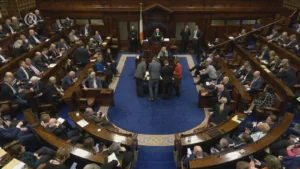The role of women in Irish politics has been a topic of significant evolution over the decades. From being nearly absent in the political arena to achieving notable milestones, the journey has been both inspiring and challenging. This article delves into the progress made by women in Irish politics, the obstacles they continue to face, and the impact of their increasing representation.
Historical Progress and Milestones
The history of women in Irish politics is marked by gradual yet impactful progress. In the early 20th century, Irish women were largely excluded from political life. The first significant breakthrough came with the suffrage movement, which culminated in women gaining the right to vote in 1918. This pivotal moment laid the foundation for future advancements, as it not only empowered women politically, but also set the stage for their active participation in governance.
The election of Constance Markievicz as the first female Member of Parliament in 1918 was a landmark achievement. She later became the first woman to hold a cabinet position as Minister for Labour in the revolutionary Dáil Éireann. These early victories, however, were followed by a long period of stagnation, with female representation in politics remaining minimal for several decades. It wasn’t until the latter half of the 20th century that women began to make more substantial inroads into Irish political life.
Contemporary Representation and Influence
In recent years, the presence of women in Irish politics has seen a notable increase. The introduction of gender quotas in 2012 was a significant step towards addressing the gender imbalance. These quotas mandate that at least 30% of political party candidates must be women, a figure set to rise to 40% by 2023. This legislative measure has been instrumental in boosting female participation in elections and encouraging parties to prioritize gender diversity.
The 2020 general election marked a historic moment, with a record number of women elected to the Dáil Éireann. This shift not only signifies progress but also highlights the growing acceptance and support for female leaders in Ireland. Women like Mary Lou McDonald, leader of Sinn Féin, and Catherine Martin, Deputy Leader of the Green Party, have emerged as influential figures, advocating for policies that address gender equality, climate change, and social justice. Their leadership demonstrates the impact of increased female representation on the political landscape.
Ongoing Challenges and Barriers
Despite the progress, women in Irish politics still face significant challenges. Gender biases and stereotypes persist, often hindering their political careers. The political arena, traditionally dominated by men, can be unwelcoming and challenging for women. Issues such as sexism, online harassment, and the struggle to balance family responsibilities with demanding political roles remain prevalent. These barriers not only discourage women from entering politics but also affect their performance and retention once elected.
Additionally, the underrepresentation of women in senior political positions is a critical issue. While there has been an increase in the number of female politicians, their presence in leadership roles such as party leaders, ministers, and high-ranking officials is still limited. This disparity underscores the need for continued efforts to ensure that women have equal opportunities to ascend to influential positions within the political hierarchy.

Impact of Female Representation on Policy and Society
The increasing representation of women in Irish politics has had a profound impact on policy-making and societal attitudes. Women politicians often bring unique perspectives and priorities, particularly in areas such as healthcare, education, and social welfare. Their advocacy for issues like reproductive rights, childcare, and gender-based violence has led to significant policy changes that benefit not only women but society as a whole.
Moreover, the visibility of women in politics serves as an inspiration for future generations. It challenges traditional gender roles and encourages young women to aspire to political careers. The success of female politicians helps to normalize women’s presence in leadership roles and contributes to a more inclusive and equitable society. By breaking down barriers and challenging stereotypes, women in Irish politics are paving the way for a more diverse and representative political landscape.
Conclusion
The journey of women in Irish politics is a testament to resilience, determination, and progress. From the early suffrage movement to the current landscape marked by increased representation and influence, women have made significant strides. However, the path to true gender equality in politics remains fraught with challenges. Continued efforts are needed to address the persistent barriers and ensure that women have equal opportunities to contribute to the political discourse. As women continue to break new ground and inspire change, their role in shaping the future of Irish politics will undoubtedly grow in significance.



